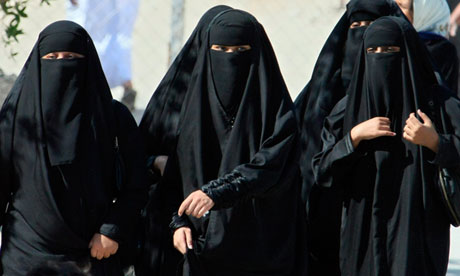குடும்பத்துக்குள் குழப்பம் விளைவித்ததற்காக இந்த மனித உரிமை சேவகர்களுக்கு தண்டனையாம்.

Saudi women are banned from driving and can only cycle in recreational areas when accompanied by a male guardian. Photograph: Hassan Ammar/AFP/Getty Images
Two female human rights activists are facing prison sentences in Saudi Arabia for delivering a food parcel to a woman who told them she was imprisoned in her house with her children and unable to get food.
Wajeha al-Huwaider, who has repeatedly defied Saudi laws by posting footage of herself driving on the internet, and Fawzia al-Oyouni, a women's rights activist, face 10 months in prison and a two-year travel ban after being found guilty on a sharia law charge of takhbib – incitement of a wife to defy the authority of her husband.
But campaigners argue the women have been targeted because of their human rights work, and fear that the sentences send out a chilling message to other activists who dare to criticise the repressive regime, under which women cannot drive and can only cycle in recreational areas when accompanied by a male guardian.
"These women are extremely brave and active in fighting for women's rights in Saudi Arabia, and this is a way for the Saudi authorities to silence them," said Suad Abu-Dayyeh, the Middle East and north Africaconsultant for Equality Now, which is fighting for the women's release. "If they are sent to jail it sends a very clear message to defenders of human rights that they should be silent and stop their activities – not just in Saudi Arabia, but across Arab countries. These women are innocent – they should be praised for trying to help a woman in need, not imprisoned."
The women were arrested in June 2011 after going to the aid of the Canadian national Nathalie Morin, who contacted Huwaider and said her husband was away from their home in the eastern city of Dammam for a week and her supplies of food and water were running out. When they arrived they were immediately arrested and released a day later.
More than a year later, in July 2012, they were called in for further questioning. Huwaider previously said she was repeatedly asked about her involvement in the Women2Drive campaign, which lobbies for women to be allowed to drive in the kingdom. In May 2011 Huwaider and Manal al-Sharif defied Saudi law and gained international media attention by driving a car, posting widely viewed footage on YouTube. She was also asked about a women's rights protest she organised in 2006 on the King Fahd causeway and her 2009 attempt to cross to Bahrain without the approval of a male guardian.
In a statement Huwaider said: "These harsh sentences that have been imposed on us will not prevent us from pursuing [the cause that is] dictated by our Muslim faith and our humanitarian and moral duty – to help the oppressed, the deprived and the needy, and to protect the rights of women in our country, in all domains, including their right to social, political and employment empowerment, and her right to drive."
Following a trial which concluded last month the judge deemed the pair were guilty of "supporting a wife without her husband's knowledge, thereby undermining the marriage". Their appeal is to be heard on 12 July and they are asking the Saudi king, Abdullah bin Abdul Aziz, for a pardon.
Huwaider had been in contact with Morin – a Canadian who married a Saudi and has been trapped in Saudi Arabia since 2005, according to her blog – since Morin's mother, Johanne Durocher, contacted her in 2009. Durocher told them Morin's husband, a former police officer, Sa'eed al-Shahrani, was abusing her and denying her adequate food and water. Speaking from Quebec, Durocher said Huwaider was the only person who helped get money to her daughter so she could feed her children. "These women have shown enormous courage in trying to help my daughter. Why are they trying to put these women in jail, just for giving another woman food? I am a Canadian, and for me this is simply unbelievable," she said. "The authorities think that if you put these women in prison, other women will not speak up – they will be even more scared than they were before."
Writing on her blog Morin, who was not called to give evidence in the trial of Huwaider and Oyouni, said she could not leave Saudi Arabia as she did not have permission to take her children and called on the Canadian government for help. She wrote: "The charges against Wajeha al-Huwaider must be cleared, she has not asked to be involved in my story and she should not suffer the consequences. She never knew me and knew nothing about me. She only wanted to help me as a woman, a wife, a mother and human being herself from what she heard by others. She never tried to make any kind of interference in my relationship with my husband and she never had a discussion directly with me."
No comments:
Post a Comment